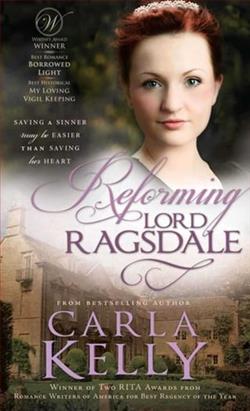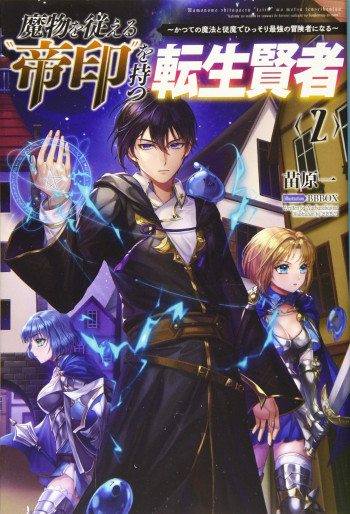
Reforming Lord Ragsdale
by Carla Kelly
“Don’t cry, Emma,” he said.
“I’m not crying,” she murmured, attempting to wipe away the tears.
“Thank goodness for that,” he replied, keeping his tone light. “ ’Pon my word, Emma, I hope you are worth five thousand pounds.”
The infamous Lord Ragsdale is as rich as sin, as sinful as he is rich, and as heartless as he is handsome. But after he saves Emma from a life of indentured servitude and shame, Emma decides that it is her personal duty to save him from his wicked ways.
Step one—stop his drinking, his gaming, and his wild revelry.
Step two—make him break up with his mistress, the superbly sensual Fae Moullé, and transform him into a suitable suitor for the ideal wife that prim and proper Lady Clarissa Partridge would be.
.
Read
Reforming Lord Ragsdale on http://kissnovel.net
Martial Peak Reviews
Carla Kelly's Reforming Lord Ragsdale is a delightful Regency romance that deftly combines themes of redemption, personal growth, and the transformative power of love. The novel is a testament to Kelly's ability to craft engaging narratives that are as emotionally resonant as they are entertaining. At its core, the book is a character-driven story that explores the complexities of human nature and the potential for change, even in the most seemingly irredeemable individuals.
The story revolves around the infamous Lord Ragsdale, a man whose reputation precedes him. He is depicted as a character who is "as rich as sin, as sinful as he is rich, and as heartless as he is handsome." This description sets the stage for a classic tale of transformation, where the protagonist must confront his own demons and embark on a journey of self-discovery. Lord Ragsdale's character is initially portrayed as a typical rake, indulging in drinking, gambling, and other vices. However, the arrival of Emma, a young woman he saves from a life of indentured servitude, marks the beginning of his transformation.
Emma is a compelling character in her own right. Her determination to reform Lord Ragsdale is driven by a sense of gratitude and a belief in his potential for goodness. Her character is a refreshing departure from the typical damsel in distress trope often found in romance novels. Instead, Emma is portrayed as a strong, independent woman who takes an active role in shaping her own destiny and that of those around her. Her interactions with Lord Ragsdale are filled with wit and intelligence, providing a dynamic and engaging narrative that keeps readers invested in their evolving relationship.
The themes of redemption and personal growth are central to the novel's narrative. Lord Ragsdale's journey from a life of excess to one of responsibility and integrity is portrayed with nuance and depth. Kelly skillfully navigates the complexities of his character, allowing readers to witness his gradual transformation. This is not a story of instant change but rather a realistic portrayal of the challenges and setbacks that accompany personal growth. The novel emphasizes the idea that true change comes from within and requires both effort and self-reflection.
Emma's role in Lord Ragsdale's transformation is pivotal. Her influence is not portrayed as a magical cure for his flaws but rather as a catalyst for his own self-improvement. This dynamic adds a layer of realism to the story, highlighting the importance of personal agency in the process of change. Emma's efforts to reform Lord Ragsdale are not without challenges, and the novel does not shy away from depicting the difficulties of overcoming deeply ingrained habits and behaviors.
One of the novel's strengths is its exploration of the societal norms and expectations of the Regency era. The contrast between Lord Ragsdale's hedonistic lifestyle and the prim and proper world of Lady Clarissa Partridge serves as a backdrop for the story's central conflict. The novel critiques the rigid social structures of the time, highlighting the limitations they impose on individuals seeking to break free from societal expectations. This theme is particularly relevant in Emma's character, who defies traditional gender roles and asserts her independence in a society that often seeks to suppress it.
In terms of character development, both Lord Ragsdale and Emma undergo significant growth throughout the novel. Lord Ragsdale's transformation is gradual and believable, with Kelly providing insight into his internal struggles and motivations. Emma's character is equally well-developed, with her strength and resilience shining through in her interactions with Lord Ragsdale and other characters. Their relationship is built on mutual respect and understanding, making their eventual romance all the more satisfying.
Kelly's writing style is engaging and accessible, with a keen eye for detail and a talent for crafting vivid, immersive settings. The dialogue is sharp and witty, capturing the essence of the Regency era while remaining relatable to modern readers. The novel's pacing is well-balanced, with a steady progression of events that keeps readers invested in the outcome.
In comparison to other Regency romances, Reforming Lord Ragsdale stands out for its focus on character development and its exploration of deeper themes. While it shares similarities with works by authors such as Georgette Heyer and Julia Quinn, Kelly's novel offers a unique perspective on the genre, emphasizing the importance of personal growth and redemption. The novel's emphasis on realistic character arcs and its critique of societal norms set it apart from more formulaic romances, offering readers a thought-provoking and emotionally satisfying experience.
Overall, Reforming Lord Ragsdale is a captivating and heartwarming story that will appeal to fans of historical romance and character-driven narratives. Carla Kelly's skillful storytelling and nuanced portrayal of complex characters make this novel a standout in the genre. It is a testament to the power of love and the potential for change, offering readers a hopeful and uplifting message that resonates long after the final page is turned.
























Reviews 0
Post a Reviews: